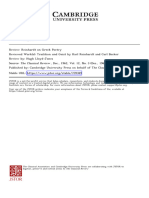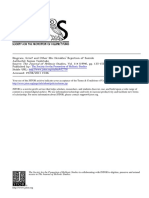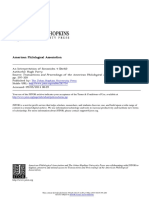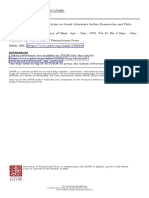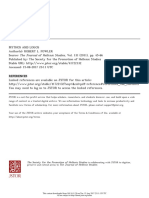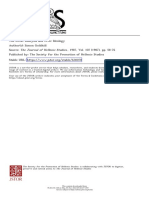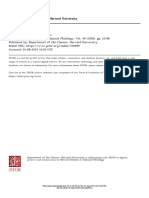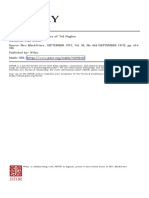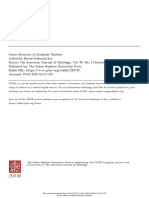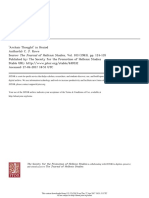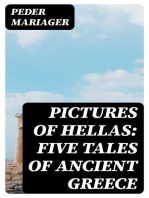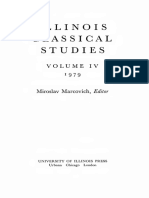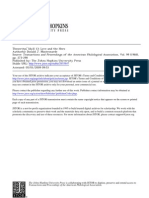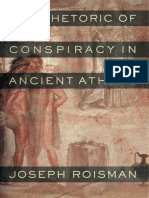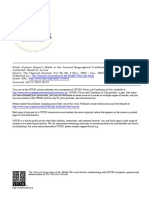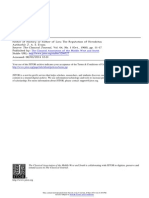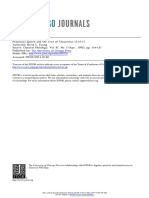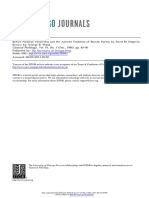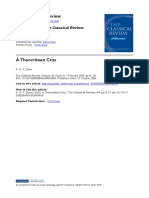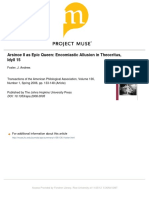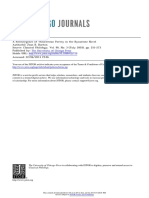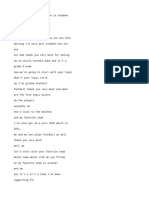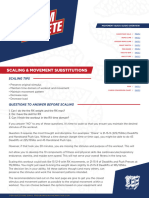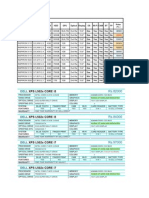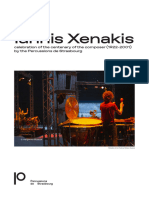J.D. Sauerländers Verlag
J.D. Sauerländers Verlag
Uploaded by
realgabriel22Copyright:
Available Formats
J.D. Sauerländers Verlag
J.D. Sauerländers Verlag
Uploaded by
realgabriel22Original Description:
Original Title
Copyright
Available Formats
Share this document
Did you find this document useful?
Is this content inappropriate?
Copyright:
Available Formats
J.D. Sauerländers Verlag
J.D. Sauerländers Verlag
Uploaded by
realgabriel22Copyright:
Available Formats
CHARITES OR HIERO: THEOCRITUS' "IDYLL" 16
Author(s): Kathryn Gutzwiller
Source: Rheinisches Museum für Philologie, Neue Folge, 126. Bd., H. 3/4 (1983), pp. 212-238
Published by: J.D. Sauerländers Verlag
Stable URL: http://www.jstor.org/stable/41233484 .
Accessed: 05/09/2014 00:49
Your use of the JSTOR archive indicates your acceptance of the Terms & Conditions of Use, available at .
http://www.jstor.org/page/info/about/policies/terms.jsp
.
JSTOR is a not-for-profit service that helps scholars, researchers, and students discover, use, and build upon a wide range of
content in a trusted digital archive. We use information technology and tools to increase productivity and facilitate new forms
of scholarship. For more information about JSTOR, please contact support@jstor.org.
J.D. Sauerländers Verlag is collaborating with JSTOR to digitize, preserve and extend access to Rheinisches
Museum für Philologie.
http://www.jstor.org
This content downloaded from 79.176.52.185 on Fri, 5 Sep 2014 00:49:36 AM
All use subject to JSTOR Terms and Conditions
CHARITES OR HIERO: THEOCRITUS'
IDYLL 16
A.S.F. Gow has calledIdyll 16 one of Theocritus'"most
remarkable achievements" and "as a whole . . . strikingly and
unexpectedly successful1)."
"Unexpectedly" is here, I imagine,
becauseIdyll16is a HellenisticpatronagepoemandGow assumes
thatas suchitshouldbe sycophantic. Thisitis notandtherein lies
muchofitssuccess.It avoidssycophancy primarilybybalancing
the businessabout a patronwithemphasison the poet's own
persona,hisstruggle to obtainsupportandrecognition. Thisis a
crucialdevelopment in thehistoryof patronage poetry,and one
withimplications forthefuture. But itsimportance has received
littlerecognitionfromscholars, whogenerally tryto fitthepoem
intoa traditional mold.It has been calleda "Bettelgedicht," a
begging or
song2), even a full-blownencomium, with a goalvery
likethatofarchaicepinician3).Thosewhohaveseenin ita poet's
1) TheocritusII, 2nd ed. (Cambridge 1952) 305. The textsI cite are Gow,
ed., BucoliciGraed (Oxford 1952); C. M. Bowra, ed., Pindari carmina,2nd ed.
(Oxford 1947); H. Maehler,ed., afterB. Snell,Bacchylidiscarminacumfragmentis
(Leipzig 1970); D. L. Page, ed., Poetae meliciGraed (Oxford 1962); R. Pfeiffer,
ed., Callimachus,2 vols. (Oxford 1949-53); E. C. Wickham,ed., Q. Horati Flaca
opera (Oxford 1901).
2) The parallelswithbeggingsongshave been stressedby ReinholdMerkel-
bach, "Bettelgedichte", RM 95 (1952) 312-23. For the generalview thatthepoem
is a petition,see Carl v. Holzinger, "Theokritin Orchomenos", Pbilologus51
(1892) 195; Ulrichvon Wilamowitz-Moellendorff, Die Textgeschichteder griechi-
schenBukoliker(Berlin1906) 154-59; Gow II 305; Paul Händel, Die Hellenistische
Dichtung(Stuttgart1960) 199; Axel Horstmann,Ironie und Humor bei Theokrit,
Beiträgezur klassischenPhilologie,Heft 67 (Meisenheimam Gian 1976) 119-37,
who finds"Selbstironie"; Anna Rist,trans.,The Poemsof Theocritus (Chapel Hill
1978) 9, 143. J.-H. Kühn, Der Adressatenwechsel in TheokritsHieron-Gedicht
(Waldkirch1978) 15, 19-20, makesthe suggestionthatthe firsthalfand probably
theconclusionare a setpiece intowhichappealsto variousaddresseeswereset,the
one to Hiero havingbeen preserved.Kiihn's work came into my handsonly after
mydraftwas essentiallycompleteso thatI was not able to use it in formulatingmy
thinking.It is significant,
therefore,thathe has anticipatedsome of my views on
the Charités.Our conclusionson this,reachedindependently and in thecourseof
generalanalysesthatdifferconsiderably,will perhapsbe the morepersuasive.
3) Most recentlyF. T. Griffiths,Theocritus at CourtyMnemosyneSuppl. 55
(Leiden 1979) 9-50, who findsboth petitionand encomium,treatsTheocritusso
exclusivelyas a courtpoet thathe declares"we maydiscountwhathe assertsabout
This content downloaded from 79.176.52.185 on Fri, 5 Sep 2014 00:49:36 AM
All use subject to JSTOR Terms and Conditions
Theocritus'Idyll 16 213
statement abouthisarthaveneglected thedominant roleaccorded
themanTheocritus appealsto4).I preferto findroomforboththe
CharitesandHiero,thetwoalternatives ofthetitle5),byshowing
thatTheocritus hadgoodreasonto groundhisappealforpatron-
age in statements aboutart.
The Charitesappearin thepoemas personifications ofThe-
ocritus'poetry;Hierois theSyracusan warlord whorosetopower
about 275 B.C. and fromwhom Theocritusseeks patronage.
Eachdominates onehalfofa poemwhichcomesclosefalling into
twodisparate parts.The motivatingforce in thefirsthalfis The-
ocritus'initialpictureof his Charitesreturning, humiliated and
angry,froma fruitless questfora patron.The painof thisrejec-
tionleads thepoet to a bitteroutburstagainstthosewho have
refused himand thento a somewhat calculatingattemptto con-
vertpotentialpatronsto a greatergenerosity. At the halfway
pointa skillfultransition changescompletely the mood of the
poem from to
despair hope,hope that Hiero, victoriousin his
imminent warwiththeCarthaginians, willfindneedofTheocri-
tus' talent.The Idyllclosesin a circularmanner, withthepoet
promising, if successfulin his quest,not to deserttheCharites,
thosegoddesseswhoserejection actedas theimpetusforthepo-
em6).
To reconcile theIdyll'stwosegments withtheircontrasting
moodsis to explainhow a petitionforpatronage, madewitha
promiseof encomium, can ariseout of a poet'slamentforthe
artisticclimateof his time.I shallarguethatthisis Theocritus'
poetry"(p. 11). See also JohannesVahlen,"Über TheokritsHiero", Gesammelte
philologischeSchriftenII (Leipzig 1923) 211; Rudolf Petroli,Die Äusserungen
Theokritsüber seine Person und seine Dichtung (Diss. Hamburg 1965) 76-81;
WernerMeincke, Untersuchungen zu den enkomiastischen GedichtenTheokrits
(Diss. Kiel 1965) 74-75, who also sees petitionas well as encomium; Francis
Cairns, "The Distaffof Theugenis",PLLS (1976) 303 and Tibullus:A Hellenistic
Poet at Rome (Cambridge 1979) 160, who believesthatTheocritusis fulfilling a
commissionfromHiero.
4) Max Treu, "Selbstzeugnissealexandrinischer Dichter", Miscellanea di
studialessandrini(Turin 1963) 283-90; Norman Austin,"Idyll 16: Theocritusand
Simonides",TAPA 98 (1967) 1-21.
5) Ine titlesin the manuscriptsprobably do not go back to Iheocntus
himself(see Gow I lxix-lxxi).They are ancient,however,since theyappear in the
scholiaand some of thepapyri(on Id. 16 see also Hermogenes1.85,p. 355 Rabe).
6) It is now generallyagreedthatthemostprobabledatefortheIdyll is 275/
4 B.C. See Gow II 306-7 (but for a reservation,cf. 326) and, on Hiero's career,
Helmut Berve, König Hieron II, Bay. Ak. der Wiss.: Phil.-Hist. KL, Heft 47
(Munich 1959).
This content downloaded from 79.176.52.185 on Fri, 5 Sep 2014 00:49:36 AM
All use subject to JSTOR Terms and Conditions
214 KathrynGutzwiller
responseto hisown disinclination to writetraditionalpraisepo-
etry.Althougharchaicencomium was indeedthedominant mo-
del forIdyll16,Theocritus' use of it showsthathe was no Pin-
dar7).He preferredlessersubjects,thosesuitableforpastoral,for
mime,formythological narrativewitha less thanheroicflavor.
The problemconfronting Theocritus thenwas thegulfbetween
hisowndistaste forthegrandandHiero'sexpectation ofglorify-
ingencomium. To establisha commongroundforpurposesofan
appealrequired theutmostin tactandrhetorical skill.Theocritus
was a masterat manipulating thesetconventions of a traditional
genrefororiginality of statement. By workingprimarily with
encomiastic precedent,he maintains theoutwardappearanceof
beinga traditional
praisepoet,butbysubtlechangesinnuancesof
meaning he shifts
theemphasisfromtheexaltedto thehumble
andfromthedeedsofthepatronto theproblems ofthepoet.It is
a techniquehe useselsewhere forotherpurposes8).Hereit is his
methodof inducingHiero to supporta poet of thenew move-
ment,or,failing that,a meansor communicating hisdilemmato
whatever sympathetic audiencetherebe.
Theocritus'problemwas onlycompounded by thekindof
praisepoetrythatwas currently beingcomposedforHellenistic
autocrats.At leastfromthe timeof Alexanderthe Greatun-
abashedflattery was thevoguein theformof bothhymnand
epic9).Hymnsdeifying generalsand monarchs weresometimes,
as in Athens(Athen.15.697a), commissioned publicly.Epicswe-
re more surelythe productof patronage.In the writingof
"Fürstenepen" thenameoffirst rankwasChoerilusofIasus,who
7) A numberof scholarshave listedparallelsbetweenPindarand Theocri-
tus: K. Kuiper,"De Theocriticarminexvi", Mnemosyne17 (1889) 378-87; E. B.
Clapp, "Two PindaricPoems of Theocritus",CP 8 (1913) 310-16; G. Perrotta,
"Studi di SIFC 4 (1925) 9-25; Alicja Szastyñska-Siemion,"Z
poesia ellenistica",
LirycznychinspiracjiTeokryta",Eos 55 (1965) 63-66. Althoueh Clapp (p. 315)
noticesthatthereis muchin theIdyll "thatis absolutelyun-Pindaric",Austinwas
the firstto point out that Theocritusconsistentlymisuses the conventionsof
encomium.Yet his discussionis only a partialexaminationof the topic.
8) See myStudiesin theHellenisticEpyllion,Beiträgezur klassischenPhilo-
logie, Heft 115 (Meisenheimam Gian 1981).
9) On hymns,see Franz Susemihl,Geschichtedergriechischen Litteraturin
der AlexandrinerzeitII (Leipzig 1892) 518-19; R. Wünsch, "Hymnos", RE 91
(1914) 168. For epics,see KonratZiegler,Das Hellenistische Epos: Ein vergessenes
Kapitel griechischer Dichtung,2nd ed. (Leipzig 1966); S. Mariotti's review of
Zieglerin Gnomon43 (1971) 145-52; Luis Gil Fernández,"La Epica helenística",
in Estudiossobreel mundohelenístico(Seville 1971) 91-120.
This content downloaded from 79.176.52.185 on Fri, 5 Sep 2014 00:49:36 AM
All use subject to JSTOR Terms and Conditions
Theocritus'Idyll 16 215
followedAlexandertheGreat10). Not onlydo we hearthathis
poetrywas poor and his flattery intense,butthetradition con-
demnshimforthegreatsumsAlexander paid:
gratusAlexandro regimagnofuitille
Choerilus, incultisqui versibuset malenatis
rettulit
acceptos,regalenomisma, Philippos.
(Hor. epist.2.1.232-34)
The ancientcommentators on Horace (Porph.ad loc; Ps.-Acro
arspoet.357)explainthatpayment wasa goldpieceforeveryline,
or at leasteverygood line.This anecdoteseemsa reflection of
Hellenistic As earlyas PindarandSimonides
aesthetics11). charges
of sellingone's poetrywereusedto impugna rival12). Although
thereis no reasonto doubtthatpompousepicwasquitelucrative,
the storiesabout Choerilusprobablystemfroman opposing
camp.
To identify thisgroupwe needonlylook at theHellenistic
poets who claim povertywithpride.Callimachusis foremost
amongthem13). In his epigramsand iambipovertyappearsin
botheroticandpoeticcontexts. His poeticcalling,combined with
hishunger, may actas a charm againstlove (Gow-Page 3 = A.P.
12.150;cf.7 = A.P. 12.148)or,alternatively, causetheloss ofa
boy to a wealthyrival{Iambus3). Elsewnere{Iambus 12) he
impliesthathisownversewilloutlastthegiftsofwealthier men.
Nor is his poetryforsale. In fr.222 he disavowsthe"working
Muse" ofIsthmian 2.6,takingit as a referenceto Simonides:
10) On Choerilus,see Crusius,RE 32(1899) 2361-63. Other writersof epic
include Simonidesof Magnesia,who celebratedAntiochusSoter, Leschides and
Musaeus of Ephesus, who servedthe Attalids(see Suda s. w.).
11) RE 32,2362; Zieeler 23.
12) If Pindar's criticismin Isth. 2.6 was not directedat an individualrival
(the scholiastsays Simonides),Xenophanes'attackon Simonides,reportedby the
scholiaston Ar. Pax 697, most assuredlywas.
13) Leónidas of Tarentum,who wroteepigramsabout rusticsand common
folk,is another(Gow-Page 33 = A.P. 7.736,36 = A.P. 6.300, 37 = A.P. 6.302; cf.
75 = A.P. 7.740). On povertyas a themein Hellenisticpoetry,see Mario Puelma
Piwonka, Lucilius und Kallimachos(Frankfurt1949) Sachregister, s. w. Armut,
Geldgier;WalterWimmel,Kallimachosin Rom, Hermes Einzelschriften, Heft 16
(Wiesbaden1960) Stichwortindex, s.v. paupertas;Giuseppe Giangrande,"Sympo-
tic Literatureand Epigram", L Epigrammegrecque, Entretienssur 1' antiquité
classique (1967) 135-39. On the povertytheme in Callimachus specifically,see
GiovanniCapovilla, Callimaco I (Rome 1967) 202-9; G. Tarditi,"Le Muse pove-
re", in StudiArdizzom II (Rome 1978) 1013-21.
This content downloaded from 79.176.52.185 on Fri, 5 Sep 2014 00:49:36 AM
All use subject to JSTOR Terms and Conditions
216 KathrynGutzwiller
ov yàg êçyanv rçécpco
Tï'vMovoav, (bçó Keloç eYXíxov vénovç.
Good poets,then,areofnecessity poorbecausetheywritefrom
the heartand not forfinancial gain.This assumption seemsto
underlie thePrologueto theAetia.Callimachus, as a composer of
shortbutfinely workedpoetry,represents himself as thecicada,
whosesustenance is onlythedewfromtheair14). We mayassume
morematerial advantages fortheTelchines, who advocateepics
on kingsandheroes15).
Callimachus himself apparently hada goodincome,oncehe
received a positionfromthePtolemies16). Thereis goodreasonto
assume,then,thatpoverty was to someextent a poseforthepoet
oftheleptotic style to contrasthimself withthe sycophantic pane-
gyrist.Callimachus did,ofcourse,writehisowncourtpoetryfor
theAlexandrian monarchs. Butitis short,oftenwitty, andprob-
ably restrained by the standards of theday. In all likelihood,he
considered ita sincere tributeto hissovereignsrather thanflattery
written forpayment.
It wasin thisambience thatIdyll16waswritten. Theproper
relationship between patron and poet, whether mercenary or
based on something morehonorable,was a burningquestion.
Praiseforhireandthepoverty ofthepoetbecameprimary themes
in thecontroversy17). ThatIdyll16 is builtuponthesethemesis
no coincidence, although givenitsearlydateit mayhavesetthe
formformuchofthediscussion. PuelmahaslinkedChoerilus and
Theocritus as devoteesofthe"Geldmuse"18). It is truethatThe-
14) Cf. Puelma 251.
15) See also A.W. Bulloch's discussionof the supplementsto Antinoopolis
Papyrus 113, fr. 1 (b) in "A New Interpretation of a Fragmentof Callimachus'
Aetia", CQ 20 (1970) 269-76. If his interpretation
is correct,we have an exciting
additionto our knowledgeof Callimachus'use of the povertytheme.According
to Bulloch,thefirstlinesof thepapyrusmay "have been a refusalto writethekind
of poetrywhichwas popular merelyformoney". But the nextlines seem to be a
confessionthatat some pointhungerhad drivenaway Callimachus'senseof shame
and inducedhim to writewhat he did not wish.
16) In fact,the Alexandrianscholars themselveswere criticizedfor their
pedantryand guaranteedincomesby Timon of Phlius (quoted by Athen. 1.22d).
For a generalaccountof patronageunderthe Ptolemies,see P. M. Fraser,Ptole-
maic AlexandriaI (Oxford 1972) 305-12.
17) For evidencethatthe controversy was developingthroughoutthe fifth
and fourthcenturies,and in philosophiccircleswithreference to avraQxeia, see J.
M. Bell, "KinßiC xai ooyóg: Simonidesin the AnecdotalTradition",QUCC 28
(1978) 38-50.
18) Puelma 252.
This content downloaded from 79.176.52.185 on Fri, 5 Sep 2014 00:49:36 AM
All use subject to JSTOR Terms and Conditions
Theocritus'Idyll 16 217
ocritussuggestshe belongsin thiscompanyby indiscriminately
sendingout his Charitesand by petitioninga OTgarrjyoçforpa-
tronaee.But,on theotherhand,his pose as poor and rejected
(whetherautobiographical or not) ties himto the Alexandrian
group19).Thisambivalent positionsuggests thatthecentralissue
inthepoemis whether Theocritus
willbe successfulbothinfind-
ingpatronage and in remainingtrueto his art.
Prooemium (1-4)
The prooemium shouldnamethesubjectofthepoem:
Atei TOVTO AtogxovgcuçtiéXei,aièv âotôoiç,
v[ivelvâ&avarovç,v'iveIvâyaûœvxkéa âvôgœv.
Moioai ¡lèvusai êvri,âeovç âeai aetôovn•
â'i'iEç ôè ßgoroioïôe, ßgorovgßgorotâeiôœfisv.
So 1-4 arereadby manyscholarsas an announcement thatThe-
ocritusis writing encomium, thathe willsingsomeoneof mor-
Certainmoreobservant
tals20). scholarshaveseeninita statement
thattheencomium willnot be a hymn21). But whatHellenistic
potentate wantedto be celebrated as a meremortalor to be ex-
presslytoldthathisstatuswas distinct fromthatofthegods?As
an openingforencomium or forpoetrythatseeksa patronofthe
ordinary type,thisis a foolhardy prooemium. AndTheocritus is
no fool,noris he so carelessas notto recognize theimportofhis
words22).
The introduction to Idyll 17, the Encomiumto Ptolemy,
showsthathe knewhowto writerhetoric thatwas bothcautious
andflattering to a patron.WhileinIdyll16theMusessingofgods
andmortalpoetsofmortalsubjects, inIdyll17Zeus andPtolemy
19) R. Stark,"Theocritea",Maia 15 (1963) 371-72, suggeststhatTheocri-
tus' povertymay be a "Dichtermaske"inheritedfromlyricpoetry.Cairns,Tibul-
lus 20-21, goes so far as to declare thatthe povertythemecombinedwith pro-
grammaticallusion to the archaicencomiasts"places Theocritusfirmlywithina
Hellenisticmanifestoframework".
20) Petroli78; Meincke36; SeverinKoster,AntikeEpostheorien, Palingene-
sia, Band 5 (Wiesbaden 1970) 115.
21) Treu 285; Griffiths21.
22) AlthoughGow ad 4 would have us thinkso. He statesthatthe distinc-
tion betweenthefunctionof theMuse and thepoet is not intentionally drawnbut
"dictated by the stiffand antitheticalformin which T. has chosen to cast his
introductory quatrain". Gow consistentlyfailsto recognizethatTheocritus'first
personutterancesuse traditionallanguageto make non-traditional statements.
This content downloaded from 79.176.52.185 on Fri, 5 Sep 2014 00:49:36 AM
All use subject to JSTOR Terms and Conditions
218 KathrynGutzwiller
seemto shareequallyinthegraceoftheMusesandtheskillofthe
poet23):
'Ex AtogaQxá>'iEG$a xai egAta Xrjysre Motoat,
ââavarœv ròvâgtoxov,ejtrjvâetôœfiev àoiôalç'
âvôgœvô' av TlxoXE'xaloç evingœxotot Xeyéoiïœ
xai Jivfxaxoç xai 'iéoooç ô yàg jzgocpegéoraroç âvôgœv.
rjgœeç,roi Jtgoaûev àcp*r)'xt$êœv èyévovxo,
gé^avreçxakà ëgyaoocpœv exvgrjoavâotôœv'
avràg êyœTlxoXe'iáíov èntoxa'ievoçxakà einelv
v'xvot
vfivrjaatfji3' ôè xai âûavaxœvyégaçavxœv. (1-8)
By setting Ptolemyinparallelfirst withZeus (1-4) andthenwith
sonsofdemigods (5-8),Theocritus enhances themortal's authori-
ty, while a
avoiding hybristic equation24).The finalstrokecomes
in line 8. Havingjust announcedhis intention to hymn(v/Avrj-
oaipi*)Ptolemy,Theocritus declaresthathymns(vßvoi) are re-
wardfortheimmortals themselves. Logicallyit scarcely follows,
butrhetorically it liftsPtolemyfromthecomparison withheroes
backto therealmofZeus himselP5).
Whythendoestheprooemium to Idyll16 go so wrong?To
someextent Theocritus intentionallythrowsus offthetrack.It is
his way in thispoem to giveus an encomiastic modebut not
encomium.Yet the prooemium is not just a red herring. If it
cannotbe readas a statement of praise,it can neverthelesshave
meaning as a declaration aboutpoetry.
Lines 1-2 appearto meanthatboththeMuses and poets
hymnbothgods and men.This is simplya conciseversionof
whatwe findinHesiod'sTheogony (44-50,100-1)26). In 3-4 The-
ocritusreorders his subjectsand objectsto makea different and
morestraightforward statement: theMusessingofgodsandmor-
talsof mortals.He seemsto be firstsettingout thetraditional
relationshipofMuses,poets,andsubjectsandthenrearranging it
to presenta new conception. But it is not quitethissimple;al-
thoughââavarovç andâsovç mustbe thesame,âyaiïœvávogójv
andßgorovgarenot.KXéa âvôgœvis a phraseas old as Homer
23) Meincke'sinsistencethatthereis a divisionbetweensingersand subjects
(36-37; 91, n. 2) ignoresápyéueo&a.
24) This technique of suggestingthat the excellenceof a contemporary
parallelsthe excellenceof gods or heroes in theirown spheresderivesfromthe
encomiasticpriamel,as forexamplethe one thatintroducesOl. 2.
25) Cf. Meincke93-94; Koster 115; Griffiths 72-73.
26) The Muses sing of both gods and men also in H. Apoll. 189-91.
This content downloaded from 79.176.52.185 on Fri, 5 Sep 2014 00:49:36 AM
All use subject to JSTOR Terms and Conditions
Theocritus'Idyll 16 219
andrefers to herotales,topicssuchas an Achilles(//.9.189)or a
Demodocus(Od. 8.73)wouldsing27). Bgoroimustbe meremor-
tals,no betterthantheßgoxoiwho singofthem28). The effect is
notto exalttheßgoroibyassociation withtheâyaâoi âvôgeçbut
ratherto marktheseparation ofthetwoinTheocritus' newpoetic
ordering.He rejectsHesiodicsubjectsand Hesiodicdependence
on theMuses.He declaresinsteadhisown poeticpreference for
ßgoroi,meremortals, notheroesor gods,subjectsamenableto
treatment withouttheMuses29).In the encomiastic contextthe
suggestion seemsto be thatTheocritus willnotallowhissubject
to masqueradein heroicor divinedress.He thusdisavowsthe
pompousflattery thenin fashionandpromises to writein a more
restrainedstyle.
Theintroductory quatraindoesthenhavean important func-
tionin thepoem.Undertheappearance ofannouncing a subject,
itinsteaddeclaresa poeticprogram. It givesus information about
thepoetqua poet,information whichwe canuse as a yardstick to
measurehis activity in thecominglines.Willhe be able bothto
finda patronandto maintain hisdeclaredavoidanceoftraditional
modesofpraise?It is indicativeofthestruggle that,whilehehere
proclaimsseparation from the Muses, he will laterfindneedof
theircompanyifhe is to celebrate Hiero(69, 101-3,107).
The Rejection(5-21)
If Theocritusdistanceshimselffromthe Muses in 1-4, in
WhiletheMuses
5-12heclaimsa specialclosenesstotheCharites.
appearas thedaughters of the gods,the
of Zeus and minstrels
27) See also //.9.524, wherexXéa âvôçwv fiçcôwvis Phoenix'sdesignation
forhis tale about Meleager,and Hes. Th. 100. For xkéoç as famegainedspecifical-
ly throughpoetry,see GregoryNagy, ComparativeStudiesin Greek and Indie
Meter (Cambridge,Mass. 1974) 244-52 and The Best of theAchaeans (Baltimore
1979) Index of Key Words,s.v. kléos.
28) Koster 114 also findsthreetopics here and connectsthe prooemium
with Theophrastus'definitionof epic as "an expressionof divine, heroic and
humandeeds" (Diom., Keil, GrammLat. I, p. 484).
29) In his ode to Polycrates(PMG 282) Ibycuslikewiserejectstopicsrequir-
ing the aid of the Muses (23 ff.).But the rhetoricaleffectis altogetherdifferent.
The refectionis just part of an elaboratepraeteritioin which Ibycus lists those
heroesand themesof theTrojan cyclewhichhe will not treat.The purposeof the
device seems to be in factto enhancethe gloryof his chosen subject,his patron
Polycrates.See J. P. Barron,"Ibycus: To Polycrates",BICS 16 (1969) 135-36; G.
F. Gianotti,"Mito ed encomio:il carmodi Ibico in onore di Policrate",RFIC 101
(1973) 401-10.
This content downloaded from 79.176.52.185 on Fri, 5 Sep 2014 00:49:36 AM
All use subject to JSTOR Terms and Conditions
220 KathrynGutzwiller
Charitésbecometheinspirers of Theocritus'own poetryand in
personifiedformeventhescrollson whichit was written. They
servehimby canvassing forpatronage and whenrejectedreturn
to crouchon cold kneesin thebottomof his coffer. By allying
himselfwithonlyone set of deities,Theocritusclearlybreaks
withtradition. Fromthetimeof HesiodtheMusesand Charités
werecompanions30). For theGreekpoettheirfunctions arenot
identicalbutcomplementary. The Museshavethepowerto make
presentforthecomposer theplacesandtimesofthepastso thathe
may celebratethedeeds of The Charitésadd
heroesand gods31).
thatqualitythatPindarcallsrà ¡leíhxa (Ol. 1.30)or rà xegjivà
xai to yXvxéa(Ol. 14.5-6); pleasure,sweetness, charmare all
subsumedundertheGreekwordxaçiç*2).The Musesthenhave
an intellectualfunction, whilethe Charitéssupplythatwhich
makesthepoetryappealing.
The divisionof laborbetweentheMusesand Charitéswas
nota forgotten relicbyTheocritus' Thisis clearfromthe
time33).
beginning of the Aetia where Callimachuslinksthe two in an
originalway. The Muse Clio to
relates himthe aition,which
first
concerns theoriginofthePariansacrifice to theCharités.At the
end of heraccountCallimachuscallson thegoddessesto wipe
theiranointedhandson his elegiesso thattheymayendurefor
manya year(fr.7). In thiswayhe acquiresthetraditional aid of
bothgroups.The Muse providesknowledgeof thepastin the
formofan aetiology. The Charités,whohavejustbeendescribed
as havingshimmering gownsand locks flowingwithunguent,
30) At Th. 64-65 Hesiod makesthe Charitesdwell beside theMuses. Euri-
pides calls theirpartnershipâôiorav ovÇvyiav (H.F. 675). See also H. Apoll.
189-96; Horn. H. 27.15; Sappho, PLF 103.8, 128; Anacreon, PMG 346, fr.
11+3+6.9-10; adesp., PMG 937.7; Theog. 15; Pi. Nem. 9.54-55, Paean 6.2-6;
Bacch. 9.1-3, 19.3-6; Arist.MeinekeCom. Gr. II, p. 1086,fr.xvi.For a discussion
of the Muses and Charitesin Pindar,see Kühn 22-29.
31) HerwigMaehler,Die Auffassung des Dichterberufs imfrühenGriechen-
tum bis zur Zeit Pindars,Hypomnemata,Heft 3 (Göttingen1963) 17-19; Jean-
PierreVernant,Mytheetpenséechez les Grecs,2nd ed. (Paris 1966) 53-54; Marcel
Détienne,Les maîtresde véritédans la Grècearchaïque,2nd éd. (Paris 1973) 9-16,
20.
32) For the Charitesin earlyGreek poetry,see Karl Deicheräber,Chans
und Chariten:Grazie und Grazien (Munich 1971) 20-36. Bacchylidesmarkswell
the distinctionbetweenMuses and Charitesat 19.1-8. The poet obtains "gifts"
fromthe Muses while the Charitescast xi'ir'upon his songs. The scholiaston Pi.
Ol. 1.30 definesyápic as "the power of poetryitself".
33) See also the evidencegatheredby Kühn 30-38.
This content downloaded from 79.176.52.185 on Fri, 5 Sep 2014 00:49:36 AM
All use subject to JSTOR Terms and Conditions
Theocritus'Idyll 16 221
symbolizethepoeticbeautywhichhis versemusthave forlasting
remembrance) .
These functionsare operativealso in Idyll 16. Theocritus
may sing of contemporarymortals,and thesealone, withoutthe
Muses35),just as in the thirdand fourthbooks of theAetia Calli-
machusfindssourcesof knowledgethroughhis own research(fr.
75.53-77). On the otherhand,the Charitésbecome indispensable
in thattheyare the personifications of Theocritus'poetryitself.
This is not a simpleassertion,as mosthave takenit, thatthepoet
is writingencomium36). It is rathera declarationthatdespiterejec-
tion his compositionshave poetic worthin the formof xágic.
There is an additionaldimensionto the word X^-Q1^which
comes into play here. It connotesnot just the pleasureof poetry
itselfbut a certainreciprocitybetweenthe giverand receiverof
thatpleasure37).The scholiasttellsus thatTheocritusis playingon
an anecdoteabout SimonideswhichconcernsX&QIÇin thissense.
In the versionrelatedby Stobaeus38),Simonidestold a potential
patron who promised%aQicybut not money, that he kept two
chests,one forxgqiteç, which was empty,and one for money,
which alone met his needs. Since the anecdotestemsfromSimo-
nides' reputationas a mercenarypoet, Theocritus'use of it sug-
gestsa self-mocking comparisonwiththe greatencomiast39). But
at thesame timehe makesan essentiallydifferent point.His Cha-
ritésare not now the "thanks" or "rewards" which othersowe
him, but his own poetry,rà oixeia noir''xaTa, as the scholiast
says. Since thepoems have foundno acceptance,thepoet receives
no XUQicin the Simonideansense. His Cnaritesremainthatonly
inasmuchas they have X^-Qicin the sense of poetic charm and
34) At the end of theAetia (fr.112) he speaks again of both the Muses and
Charites,but the contextis too fragmentary to determinewhat connectionhe
givesthem.
35) In Id. 22 as well I heocntusshows somethingless thantotaldependence
on the Muses. He considershis song a productof both the Muses and his own
olxoçyhis unique talent(221-22). It should be noted thatthe Muses are needed
here because the Dioscuri are not simplemortals,but heroesand gods.
36) This view is most tullylaid out by Perrotta13-14.
37) See Emile Benveniste,Le vocabulairedes institutions indo-européennesI
(Paris 1969) 199-202; JoachimLatacz, Zum Wortfeld"Freude" in der Sprache
Homers (Heidelberg1966) 78-98.
38) Other sources are Plut. Mor. 520 A, 555h, scholiaston Ar. Fax 697,
Tzetz. Chil 8.814ff.The variantsin the traditionare discussedby Carl Wendel,
Überlieferung und Entstehungder Theokrit-Scholien (Berlin 1920) 104, n. 1.
39) Cf. Austin 9-16; Horstmann128. On Simonides' reputation,see Bell
29-86.
This content downloaded from 79.176.52.185 on Fri, 5 Sep 2014 00:49:36 AM
All use subject to JSTOR Terms and Conditions
222 KathrynGutzwiller
beauty.Theocritusthus assertsboth his povertyand his pride in
his art.
If the Charitésare poems in which Theocritustakes pride
because of theirpoetic qualities, not just encomia for various
greedypotentateswho care not at all about artforart'ssake,the
close bond betweenpoet and goddessesis easier to understand.
The goddessesexhibitfeelingswhichbelongproperlyto thepoet
himself.Theirbarefeetand cold kneesare at leastpartlyan indica-
tion of theirmaster'spoverty40).The positiontheyassumein the
bottomof thecoffer,head on knees,denotesgrief41), a projection
of thepoet's sorrowover his lack of success.Theiranger(oxvÇo-
fievai, 8) and jeering(xcoâaÇoioai, 9) may suggesthis own self-
criticism.But we should not forgetthat inspiringdeitieshad a
traditionalrightto admonishand upbraid.It is enough to recall
the Muses' addressto Hesiod (Th. 26), Apollo's instructionsto
Callimachus(Aetia, fr. 1.21ff.),and even Lycidas' teasingof Si-
michidas(Id. 7. 19-26)42).The mockeryof theCharitésmay be of
thissort,an indicationthatthepoet does not quite have his house
in order,thathis own ambitionsare out of line withthedemands
of his art.
Apartfromtheplay on thebiographicaltraditionconcerning
Simonides,the pretensethatTheocritusis a writerof encomiais
evidentin his use, or rathermisuse,of encomiasticrhetoric.The
questionrig yàg xwvónóoot (5), whichopens the poem proper,
and its repetitionin similarlanguagein 13, xlç xcbvvvv xoióooe,
recallin formthe openingof an epinicianby Simonides43):
tlç ôrj xœvvvv roaaô3 rjJtexáXoioi¡jlvqxcùv
f' oxecpávoLOi QOôœvàveòr'oaxo,
vixaoaiç êv âyœvijvsqlxxióvwv; (506 PMG)
But the difference betweenthe two is instructive. Simonidesasks
who has won as many victoriesas Astylus, and the answer,
40) Merkelbach315 pointsout thatbeingbarefootis a conventionalmotifin
beggingsongs sung by children.
41) See Gow ad 10ff.,where he also points out the suggestionof their
crampedpositionin the coffer.
42) The warningdeitiesin Augustanpoetryare characteristically abusive.
Apollo tweaks Vergil's ear (Eel. 6.3-4), calls Propertiusdémens (3.3.15), and
warns Horace with a harshtwang of the lyre (C. 4.15.1-2). A laughingCupid
snatchesa footfromOvid's hexameterline (Am. 1.1.3-4) and elsewheremakesfun
of his tragicdress,buskins,and scepter(Am. 2.18.15-16).
43) Austin 3-4 has pointed out the conventionalnatureof the aporia in
Theocritus' question. The traditionalfunctionof such an aporetic question is
preservedin Id. 17.9-12.
This content downloaded from 79.176.52.185 on Fri, 5 Sep 2014 00:49:36 AM
All use subject to JSTOR Terms and Conditions
Theocritus'
Idyll16 223
whether impliedor stated,was "no one". Similarin structure is
Theocritus'"Who willreceiveourCharites?"withtheanswer"I
don'tknow".Yet Simonides is emphasizing theuniquesuccessof
hispatron,whileTheocritus despairs of ever findingone.Hereat
the very beginningof the poem, Theocritususes traditional
rhetoricalfiguresto bringintosharpcontrasttherealityof his
own age andtheidealsofthearchaicone.
His languagealsorecallsthePindaric idealizationoftherela-
tionshipofpatronandpoetas thatofhostandguest.Thefollow-
ingpassageis a goodsummary ofit,thepoetappearing as Çeîvoç
and thepatronas cpiXog:
'
^eivogeifiiaxoreivòvàné%wvipóyov,
vôaroç ère goàç cpíXov ' èç âvôg3âycov
xkéoçETr'TV'iov aívéoco (Nem.7.61-63)
In exchange forhospitality thepoetcreatesfame(xXsog)forthe
victorthrough praisepoetryandthuskeepsawaytheblame(tyó-
yoç)thatmightdarkenhismemory. It is clearthatTheocritus has
thearchaicidealin mindwhenhe askswhowillpatronizea poet
oftalent(rigev eijiovxaquXrjoei, 13).In 6 jzexáoacputsthesame
emphasison hospitality by recalling thePindarictoposthatthe
victor'sdoors are spreadwide and throngedwithguests(see
Nem.9.1-3,àvaKEnxa'iévai).ButTheocritus' poemshavefound
no opendoors.Thereareno patronsto matchthoseofPindar's
day.Greatmendo notwishto be celebrated (atveiaaai, 15) for
nobledeeds,forprofit is nowthevictor(vsvLxrjvrai ô' vicoxeç-
ôécov,15).
If generosity deservespraise,thecorollaryis thatniggardli-
ness elicitsblame44).This premiseis implicitin Pindar,who
claimsas hishighest functionto praisetheworthyand to blame
theunrighteous:
aivécovaivr'xá, 'io'içpàvô3 ejiiojieÍQíovàXixQolç.{Nem.
8.39)
ButPindarintruth is concernedonlywithpraise.Theblamewor-
thyappear in hispoetrymerelyas a brieffoilforthelaudandus.
Theocritus, on theotherhand,assumesthetoneoftheblamepoet
in satirizingthemiserclutching hismoneyunderhiscloakandin
listingthe selfish excuses he has received(16-21).Here we have
notjusttheHellenistic poet'spenchantformime,buta bitterness
44) See Nagy, Best of theAchaeans 237.
This content downloaded from 79.176.52.185 on Fri, 5 Sep 2014 00:49:36 AM
All use subject to JSTOR Terms and Conditions
224 KathrynGutzwiller
reminiscent ofthatofArchilochus
orHipponax45).It is significant
thatscholarshavefounda parallelbetweenTheocritus' lament
hereand Callimachus'similarcomplaint in Iambus346),a piece
clearlyinthetraditionofblamepoetry.Evenso, doesTheocritus'
stanceas a blamepoethavean underlying
encomiastic purpose,to
pointup a contrast withhislaudandusHiero?If so, it is a very
minorone,forwe areyetto hearofHieroforoverfifty lines.In
its contextthe sectionis moreconcernedwiththe poet,with
hismoodofdespairandthereasonsforit.
illustrating
Attempt at conversion(22-57)
Havinggraphically depictedthedifficulties of obtainingpa-
tronagein the currentage, at 22 Theocritusturnsto advising
potentialpatrons.Wealthis no advantage if hoarded.The rich
manshoulduse it forpersonalenjoyment, thebenefit offriends
andgods,andespecially to honorpoets47), fortheyproducefame,
all thatcanremainfora manafterdeath.Thesearethevaluesthat
thewriters of epinicianadvocate,granting themto theirpatrons
in themannerof praise48). In Theocritus theyseempartof an
attempt to converthis contemporaries to theidealsof a former
age, or, more indirectly, advice addressedto Hiero himself
a
through "mock-debate"49). In eithercaseTheocritus'purposeis
clearlynot,likePindar'sor Bacchylides', encomiastic,but is it
evenseriouslydidactic?Does he trulyignorethe changesthat
haveoccurred sincethefifth century inorderto promote"a resti-
tutionofpoetryto itsold rolein society"50)?
The threemainpointsin22-33- hiddenwealth,treatment of
one's fellows,reputeor lack of it in Hades - appearin more
concisefashionin Isthmian1.67-68:
45) Hipponax himselfis a beggarand povertyone of his themes;see West
frs.32, 34, 36, 38, 39.
46) Meincke72, n. 1: Horstmann135.
47) AlbertWifstrand,"Zu TheokritsCharites",Miscellaneadi studiales-
sandrini(Turin 1963) 308-9, has argued that füáhara in 29 does not modify
Movaáwv vjto(prjraçbut theoyça clause in 30. Wifstrandbases his argumenton
his belief that the poet would not make a "wenig anspruchsvollund taktlos"
statement.Meincke49, n. 1 has effectively refutedthe argument,and we shall see
thatthe whole passage is decidedlyself-servine.
48) See Bacch. 3.10-21: Pi. Isth. 1.67-68,Nem. 1.31-32.
49) The phraseologyof Griffiths 29; cf. Meincke51, Horstmann132.
50) Griffiths 30.
This content downloaded from 79.176.52.185 on Fri, 5 Sep 2014 00:49:36 AM
All use subject to JSTOR Terms and Conditions
Theocritus'Idyll 16 225
ei ôé tlç ëvôov véfiSLjïXovtov xgvqpmov,
âXXotoiô3 êfbUTLJtrcov
yeXà,ipv/àv 'Atôg reXswvov
cpQá&TaLôo^aç avevâev.
Theocritus
has addeda listingof thoseto receivetherichman's
bounty,perhapspartially
inspiredbypassageslikeBacchy lides3.
13-16:
oiôe jïvgycoâévTajïXovtov¡nfj'ieXa[i-
tpCJLQéïXgVJTTELV OKOTO).
ßgvet¡xèvlega ßovdvTOtg êogTaîç,
ßgvovotyiXo^eviaçâyviai. . .
Buttheepinician modelsdo notaccountforhisdoubleemphasis
on generosityto poets(24, 29). In suchpassagespoetsneednot
appearatall,becausereferences tactful-
to thepatron'shospitality
ly emcompass the entertainment and payment of thesinger.Cor-
respondingly,thesongwas considered a guest-gift,
neverwares
forwhichpayment wasdue51).Theocritus hintsatproperconduct
towardspoetsbyinstructing thehostin rulesofetiquette
(rgané-
Çr]f£iXi§avT3 êjïfjvèûéXwvTivéeo&m,27-28). Such a
âjiojté/Liipai
reference wouldbe sufficient ifheweretrulyinterested inreestab-
lishing the moral code of the Pindaric era. But he is not; his
purposeis muchmoreself-serving. The doublereference to giv-
ing to poets harksback to the Charitéswho weredismissed
aôœgrJTOvg (7)52)andmakesit clearthatthisis merelvan appeal
forfunds.The Pindaricmoralizing is undercut, forTheocritus is
in truthoffering hispoemsas merchandise.
It is a commonplace of archaiclyricthatto die unsungis to
dwellinHadesâxXerjç?3). Theocritus givesa faithful
reproduction
ofthisin 30-31andfollowsitwitha comparison oftheforgotten
deadmanto a peasantwithcallousedhandsweepingforhislack
of patrimony (32-33).Perrottamaintains thatthesimileis based
on a lyricconvention likethatin Nemean7.19-20,âcpveoçjzevi-
Xgoç te ûavaTOVJtégaçä'ia veovtcu54). Pindar'spointis that
greed is useless because both rich and poor arefatedto die. But
Theocritus is sayingsomething else.He comparesthesorrowof
thenoblewhodiesunsungto thelamentofthepoorlaborer while
51) See Hermann Fränkel,Early Greek Poetryand Philosophy,trans.M.
Hadas and J. Willis (New York 1973) 430-33; Maehler 88.
52) bo Horstmann126.
53) Most clearly stated at Pi. O/. 10.91-93; see also O/. 8.72-73, Isth.
1.67-68.
54) Perrotta18.
15 Rhein. Mus. f. Philol. 126/3-4
This content downloaded from 79.176.52.185 on Fri, 5 Sep 2014 00:49:36 AM
All use subject to JSTOR Terms and Conditions
226 KathrynGutzwiller
alive.He thussuggests topotential patrons thatbeingforgotten in
Hades is no worsethanpoverty on earth.It is scarcely an archaic
sentiment55); itonlyappearsto be. Self- advantage is againevident
inthatTheocritus subtly enticesthe richto pity plight.Butthe
his
similehas anotherfunction, forit introduces whatwill be an
important themein thepoem,theproperrelationship ofrichand
poor.
Thisthemecarriesoverintotheexemplaoffamouspatrons
remembered only becausetheirdeeds werepreserved in song
(34-47). Againwe are dealingwitha Pindarictopos,as forin-
stancePythian1.92-9456):
omaofj,ßgorov av%r)'iaôoÇaç
oiov âjtOLXOfLiévœv avôgœvôiairav 'iavvei
xai XoyioLÇ xai âotôolç. ov cpaiveiKqoí-
oov yikócpQüJV acera.
Theacera whichbrought Croesusfameis hisgenerosity, a quali-
tywhichPindarhasjustbeenrecommendine to thelaudandus.In
Idyll16 themention ofthewealthoftheAleuadaeandScopadae
has ostensibly thesamefunction, to demonstrate thevalidity of
Theocritus' previous advice. But the bucolic coloring of the pas-
sagebrings otherconcerns to thefore.Thereis an explicit contrast
between theforgotten nobleandthelordsremembered inSimoni-
dean song.Implicit,and morevisibleto the reader'seye,is a
contrastbetweenthesorrowofthepenniless laborer(32-33)and
the contentment of the neveoxaiwho have generousmasters
(34-35).ThecattleoftheScopadaeandthesheepoftheCreondae
continuewhatseemsa digression in evenhumbler terms.These
pastoralvignettes threaten to overshadow thepointto theextent
thatthe scholiastis compelledto interpret: Theocritus simply
meansthatthe Thessaliannobles were verywealthy.Pindar
wouldhavestressed theirlargesse. Theocritus doesnotbecausehe
is notso muchinterested in celebratingthevirtues ofSimonides'
55) Horstmann 126, n. 55 suggeststhat Theocritusis playing on Od.
11.488-91, where Achilles lamentshis fate in the underworld.But Theocritus'
forAchilleswould preferthe lifeof poor laborer.
pointis essentiallydifferent,
56) Horstmann127-28 and Griffiths 30 have assertedthatthe exemplain
34-57 substituteforthe paradigmaticmythof Pindaricencomium.But Theocri-
tus, who is not writingencomium,is not followingencomiumform;he merely
presentsa pasticheof Pindaric,or Pindaric-sounding,sententiae.Kuiper 386 and
Perrotta19 note the correctparallels.
This content downloaded from 79.176.52.185 on Fri, 5 Sep 2014 00:49:36 AM
All use subject to JSTOR Terms and Conditions
Theocritus'Idyll 16 227
as in showinghow wealthcan be used to benefitthe
[)atrons
owly.
Whilethe serfsand theiranimalsare picturedbucolically
contentin theirfieldsand folds,the lordsthemselves we find
alreadyintheunderworld (40-46).Byconstructing a contrary-to-
factcondition witha four-line apodosisprecedine theprotasis and
no modaladverb,thepoetemphasizes lackofpleasurein earthly
goods,abandonment of wealth,the long durationof wretched
death.And,in fact,Simonides' songchangesnoneofthis:"They
aredeadandtheywouldhavebeenforgotten"57). In theendThe-
ocritusdoes mentionthe n/ir/ earnedby theirprize-winning
horses,butitis somehowsmallconsolation following hisdescrip-
tionofthevictors'endlesssadnessin Hades. The sententiae may
be Pindaric, buttheirapplication producespurepessimism. As an
attempt to convincecontemporary menofwealth(including Hie-
ro) to supporthimas a writerof encomium, thepassageis not
likelyto be effective.
The characters fromthe Cypria,Iliad, and Odysseywho
forma secondseriesofexempla(48-57)also havemodelsinPin-
dar,as in Pythian3.112-1458):
NéoTogaxai AvxiovZagjzaòóv' âvûgœjtwv yanç,
e§ ênécovxeXaôevvœv, réxroveçola ooçpoi
aQ'iooav, yivaoxopLev ...
But Theocritus' choiceof heroesis curious.As Griffiths points
out,theLycians,thesonsofPriam,andCvcnuswithhisfeminine
skinare all losers59).
Odysseuscertainly has xXéoç,butwhatof
Eumaeus,Philoetius,and Laertes?No Hellenistickingwould
wishforthekindof remembrance thatfolloweda swineherd, a
neatherd, and a debilitated
old man. Thistrioowes its presence to
Theocritus' owninterest inthebucolicandthehumble. Justas the
wealthof theScopadaeand Aleuadaereminded himof thepea-
santsandbeastswnosharedtheabundance oftheirestates,so the
mention ofOdysseusbringsto mindthelesserbeingswhogained
famethrough his. At thispointTheocritus' argument has come
fullcircle.He set out to show thatthebenefit(ovaoig,23) of
wealthforthewise was famethroughpoetry,but he endsby
demonstrating thatpoetsbenefit (œvaoav,57) notjustheroesand
menofpositionbutthelowlyas well.If theprooemium is truly
57) Gow ad 43.
58) See also Nem. 7.20-21, Istb. 5.26^28.
59) Grithths31.
This content downloaded from 79.176.52.185 on Fri, 5 Sep 2014 00:49:36 AM
All use subject to JSTOR Terms and Conditions
228 KathrynGutzwiller
programmatic in thesensethatit helpsus findourwaythrough
therhetorical subterfuge of thepoem,we arejustified in seeing
hereTheocritus' own poeticpreferences. It is no wonder,then,
thathe immediately breaksoffhis attempt to converthisclose-
fistedcontemporaries to themorality of thePindaricage,having
justdemonstrated hisowninability to writepoetrywhichreflects
thosevalues.
The Pindarictopoiof 22-57 reappearin Idyll 17.108-20.
Theretheyaretrulyencomiastic, celebratingPtolemy's generosi-
ty to gods,subjects,and poets.The last have place of honor
becausetheyensurePtolemy ofxkéoçtorivalthatoftheAtreidae.
If Theocrituscanwriteencomium rhetoricwhichis effective and
he can
complimentary, surely use thesame commonplaces to pro-
duce advicetnatis persuasive. His failureto do so in Idyll 16
seemswillful.It is not,then,a seriousattempt to convert those
who rejectedhispoetryto outmodedmores,or evenadviceindi-
rectlyaddressedto Hiero.It rathertellsus something aboutthe
poethimself.He needsfinancial supportandis willingto evincea
Pindaricmodeto getit. Yet his sympathies lie withunderlings,
andheis trulyconcerned withthegreatonlyinasmuch as theycan
nurtureand supportthe humble.His need forpatronagethus
standsinconflictwithhispoeticinclinations. Ifthereis a message
to Hiero,thisis it, withhope thatthe Syracusan willprovide
patronagein exchange forwhatTheocritus wishesto give.
Transitionto Hiero(58-70)
Beforesetting out thepossibilityof an alliancewithHiero,
Theocritus mustdisassociate himselffromthoseavaricious souls
he has beenpetitioning60).In biddingfarewellto themancpiko-
xeçôeiçLßeßXafifievov (63, with Pindaricwording;cf. Nem.
7.18),he impliesthatthenewmanon whomhe pinshishopesis
notofthisilk.The transition inseparating
effective
is rhetorically
HierofromTheocritus' rather distasteful of
picture contemporary
menof wealth.But to see everything in thepoemas addressed
to Hierois to missmuchofimportance.
rhetorically Thepersona
of thepoetalso undergoes a changein thecourseofthesetransi-
tionalfines,
a changefromdespairto hope.Thisshift inattitude
is
60) I make no judgmentabout whetherTheocritus'poetryhad in factbeen
rejectedby potentialpatronsand who suchmenmayhavebeen. For theinterpreta-
tion of the poem it is importantonly thatTheocritusrepresentsthis as having
happened.
This content downloaded from 79.176.52.185 on Fri, 5 Sep 2014 00:49:36 AM
All use subject to JSTOR Terms and Conditions
Theocritus'Idyll 16 229
not arbitrary, simplya devicefortyingtogether the disparate
moodsofthepoem'stwosegments. It is rather directlyrelatedto
thepoet'sdecisionto abandonthe"Geldmuse"andto seekpatro-
nageon a morehonorary basis.To seethiswe needto looknotso
muchat whathe saysexplicitly butat whathisrhetoric implies.
He beginsthetransition in traditional encomiastic fashion
withtwo gnomiclines(58-59)whichsumup whatwentbefore
and markthechangein attitude. Whilethejuxtaposition of the
sentiments is Pindaric(see O I. 10.86-96),in Theocritus theyare
suggestive ofsourgrapes:"FromtheMuses(i. e., byhiring meto
writeencomium) good fame comes to men, but thelivingsquan-
der the moneyof the dead (i.e., see whatwill happenif you
don't)."In Pindarthetaskofpraising thelaudandusis likecount-
inggrainsofsand(O/.2.98) or pebblesin thesea (Ol. 13.45-46).
By a similaradynaton, counting thewaveson theshore,andthe
additionofanother, washing a mud brick,Theocritus conveysthe
of the
impossibility changing greedy. again He uses encomiastic
conventions, notto praise,butto lamentthecircumstances that
makepraiseimpossible. Yet thewordingofthesecondadynaton
providesthefirstindication of thepoet's shiftin attitucfe. The
proverb intheforms citedbyGow,nXiv&ov tïXvvslç andlaterem
Lavare,indicates simplythata brickcannotbe cleansedbecauseit
will disintegrate. The additionof the adjectiveôiaeiôét (62),
especiallyin juxtaposition withuoXsgav,suggests a furtheridea:
clearwaterusedto washa mudbrickbecomesmudtoo.Theocri-
tushintsthatthetaskofwinning patronage fromthegreedy is not
only impossiblebut defilingas well. This criticalview of his
previousactivities becomesclearerin theconcluding segment of
theadynata(63). Horstmann hascorrectly arguedthatthemean-
ingofJtagsXâetv hereis not"to persuade",as Gow translates it,
but"to deceiveand to takesomething" (anaxf'oai xai âcpeXelv
r¿,as thescholiastsays)61). If we acceptthismeaning, Theocritus
mustbe admitting thathis didacticstancewas a merecoverfor
soliciting.
Theocritus' openassessment ofthemonetary motivebehind
hisprevious for
appeals patronage leads to theturning pointinthe
poem.In a farewell formula (xaigéxo)oartçtoloç,64) he spurns
notonlytherichmanbuthis"boundlesssilver"as well.He now
prefersthe"honorand friendship of men"to "manymulesand
horses".We mayremember that(piXÓTqg (66), denoting Pindaric
61) Horstmann129-30.
This content downloaded from 79.176.52.185 on Fri, 5 Sep 2014 00:49:36 AM
All use subject to JSTOR Terms and Conditions
230 KathrynGutzwiller
guest-friendship, was previouslya euphemismfor generosityto
poets (çiXrjoeL,13). Now Theocrituschooses (piXóxì]cin place of
wealth,specifically thekindof wealthpossessedby thepatronsof
Pindar and Simonides.And he adds the word TXjUr/, which does
not now referto theprestigeof a victor(cf.46), but to respectfor
the poet himself.In thisway the basis on which he seeks patro-
nage is modified.Supportis not to be givensimplybecause of a
promiseof poetic immortality, but because the patronsees in a
poet's work those qualitieswhichwill make it endure.The next
line suggeststo Hiero just what Theocritus'talentsare.
Theocritusdeclaresthathe seeks someone to whom he may
come with the Muses nexagiofiévoc(68). At thispoint scholars
usuallydespairof makinghis originalstatements about theMuses
and Charitésfitwiththe restof thepoem. The solutionhas been
to assertthat the Muses in 69 and at the close now represent
Theocritus'own poetry,whereastheCharitésof theclose become
reverencedgoddesses ). But does Theocritusconfoundthesister-
hoods in thisway? It is certainlywrongto considertheCharitésas
now poems, now goddesses in Idyll 16, forTheocrituschooses
thattheybe both. On the otherhand, I see no evidencethatthe
Muses are ever personifiedpoems or that "with the Muses"
means anythingotherthan "with the inspirationof the Muses".
The problemarisesbecause in 68-69 and at the conclusionTheo-
critusseems to enjoy the inspirationof those veryMuses from
whom he set himselfaloof in theprooemium.Yet it is only select
topics,the ßgoroiythatthe poet may handle withoutthem;the
Muses sharewithpoets thetaskof hymninggods and heroes,the
traditionalcomparandaforthe subjectsof encomiasticpoetry.So
in offeringto write encomiumfor Hiero, to celebratehim as
JtgoréQOLÇ ïooç fjçœeooi (80), Theocritusmust claim theirsup-
port. Lines 69-70 explainwhy it is necessary.The statement that
journeysare difficult forpoets withoutthe daughtersof Zeus is
not justa traditionaldeclarationthattruepoetrvis inspiredpoetry
(cf. PindarPaean 7 b.3-5). It means literallythattravelling
poets
need theMuses63),fortravelin Idyll 16 is connectedwithpraiseof
a patronand thusrequirestheMuses as inspirersof encomium(cf.
107). Before,he was sendingout theCharitésalone,and theresult
62) MargritSanchez-Wildberger,Theokrit-Interpretationen (Diss. Zurich
1955) 10-12; Meincke38, 59, 71; Rist 146-47; Griffiths
44.
63) So R. J. Cholmeley,ed., The Idylls of Theocritus,2nd ed. (London
1919) ad loc. Cairns,"Distaffof Theugenis"302, makesthe same point about the
journeyin Id. 28.
This content downloaded from 79.176.52.185 on Fri, 5 Sep 2014 00:49:36 AM
All use subject to JSTOR Terms and Conditions
Theocritus'Idyll 16 231
was failure.Now thepoetseemswillingto makecertain compro-
misesto winthepatronage of Hiero.
Whatthenof nexagioiaévoç in 68? It is usuallytranslated
"welcome"and repeatsàojzaoiœç of 7. It also continues theSi-
monidean joke,suggestingthatHierowillreceivehimwithboth
gratitude and reward.But, giventhe idea of reciprocity in the
word, it hintsas wellthat
Theocritus will his
bring patronxaçtÇ
in thesenseof bothfavorand poeticcharm.It theMusesfinda
placeofprominence herewhereTheocritus firstoffershispoetic
to Hiero,atthecloseofthepoemhewillboldlyassertthat
talents
notjusttheMusesbuttheCharitesas wellwillaccompany himto
thepatron'shouse.
Hiero(71-97)
AftermorethanseventylinesTheocritus finallycomesto
whatmanyconsidertheencomium proper.Yet we look in vain
foranyreference to Hiero'snobleancestry, birth,youth,gener-
ous use ofwealth,pastmilitary exploits- all thestandard topics
foundin theEncomium toPtolemy. Praiseis offuture events,the
battles
thatHieroprepares forandtheresulting peacethatthepoet
praysfor.Theusualexplanation is thattherewasnothing glorify-
ingto be saidaboutHiero's His ancestry
pastlife64). is uncertain,
he heldtheofficeof argarriyog avroxgárcogthroughforceof
arms,and his majorbattleswereyetto be fought6>We may
agreethatit was bestto steerclearof thepast.Yet fora poet
seekinga patronthereare advantages in concentrating on the
future.It allowshimto skirttheembarrassing questionofwhyhe
hasnotpreviously beencalledupon.Andbymakingthepatron's
needof himyetto be realized,he can to someextentdefinethe
areasof thatneedin his own terms.Thus we findtheso-called
encomium beginning withconcerns properto a war-lord butend-
ingwith a bucolicSicilythatknows thebattle-cry no more66).
The scenesofHiero'svictory anditsconsequences forSicily
arenotthenstrictly encomiastic,but rathersketches of encomia,
samples of what the poet might offer.At the startthe formal
natureof thebattledescription suggests encomium of thetradi-
64) Meincke64-65; Horstmann136; Griffiths 13-14.
65 Berve 7-10.
66) The futuretenseis used in a somewhatanalogousfashionin the Roman
recusatio:see, forexample,Verg. Ed. 8.6-10, Georg. 3. 10-48; Prop. 2.10.19-20.
This content downloaded from 79.176.52.185 on Fri, 5 Sep 2014 00:49:36 AM
All use subject to JSTOR Terms and Conditions
232 KathrynGutzwiller
tionalsort.By comparing HierowithAchillesand Ajax and by
recallingbriefly a Homericarmingscene(cf.Gow ad 81),The-
ocritushintsat an epicmode,ifnotepic.Withhisprayerto the
Syracusan trinity of Zeus, Athene,and Kore he returns to the
modelofarchaicepinician whichhasbeenso predominant in the
poem.It is an unmistakable reference to Pythian1.67-80,which
celebrates the earlierHiero's triumph at Cumae. The prayer's
initialdarknotedetailing thedevastation ofthePunicforcesgives
waytolonging fortheblessing ofpeaceupontheSiciliancountry-
side.This too has its startin thePindaricprayer.But Pindar's
merereference to r'ovxia(Pyth.1.70) is transformed intoa de-
taileddescription ofthelégwvoçeigr/vr]. WhileBacchylides pro-
videsa modelforthearmscoveredbyspiderwebsandtheforgot-
tennameofwar-cry (Paean4.69-70,75),theyenda listofimages
thathaveno counterpart in archaicencomium. Fieldsin bloom,
pasturine sheep,homingcattlehastening on theevening traveler,
thecicadasinging fromhisperchto shepherds atnoondayrest,all
arisefromTheocritus' bucolicproclivities.Aftersuggesting praise
poetryin thetraditional forms ofepicandencomium, Theocritus
bringsforthnewpossibilities in therealmofbucolic.
As thebondbetweenpatronandpoetchanges, so withitthe
natureof encomium. Throughthetiesof guest-friendship a poet
ofanystatemayhymna lordofanyotherstateas heroandvictor.
So Pindarwasthecelebrant ofmanyanddiverse patrons. Butitis
only a nativepoet who seespraise ofthe ruler's
deeds in the peace
ana contentment thattheybringto thecountryside. At leastwe
mayso interpret Theocritus' bucolicscenes.Thatpoetryof the
pastoraltypewasinfacthispreference is therhetoricalsuggestion
of muchthathas gonebefore.The prooemium setsout thepro-
grambyconverting heroesto mortals ofa statureto matchthatof
thepoet.Ifthewordßgoroienhances Hieronotatall,itsuitswell
themassof subjectswho will enjoyhis deliverance. The serfs,
cattle,andsheepoftherichThessalians findtheircounterparts in
theSicilianlandscape.As we saw,thebenefits of wealthforthe
lowlyof ThessalytouchedTheocritus as muchas or morethan
theposthumous famepurchased by Simonides' patrons.In Sicily
too thewell-being ofthelandanditsinhabitants seemsas impor-
tantto thepoetas Hiero'sxXéoç.The exampleof Odysseusand
hisfaithfulservants preparesus fortherelationship between Hiero
andhispeople.It also actsas a justification forchoosing pastoral.
If Homerwroteof Eumaeus,Philoetius, and Laertesas well as
Odysseus, then Theocritus may celebratebucoliclifeas well as
This content downloaded from 79.176.52.185 on Fri, 5 Sep 2014 00:49:36 AM
All use subject to JSTOR Terms and Conditions
Theocritus'Idyll 16 233
Hiero67).The rhetoricalforceofthewholepoemcomesto a head
in thispassagewhichseeksto persuadeHierooftwopoints:first,
thatpatronage forTheocritus resultof hisown
is theinevitable
agerrj and the nativepoet's desireto singof it; secondly,that
poetrywitha bucoliccastcanpraisea ruleras wellas moretradi-
tionalforms.TheIdyllthusbecomesan elaborate for
justification
granting to a
patronage pastoralpoet.
Conclusion(98-109)
Havinggivensamplesof encomia,Theocritusimaginesa
corpsofpoetsreadyto composethem.Continuing intheoptative
mood,he wishesthatâoiôot bringHierovtprjXòv xXéoçextend-
ingbeyondtheScythian sea and to thewallsof Babylon.He is
onlyone,butthedaughters ofZeus lovemanyothersbeside.The
withdrawal of thepoetintoa crowdof encomiasts is highpraise
forHieroindeed,butcuriously violativeoftraditional encomias-
ticrhetoric.It is truethatthephrasexXéoçviprjXóv appearsnear
theendofPindar'sthirdPythian (111)to HieroI andthatuniver-
salizingdoubletsin theformofgeographical references arefound
in archaicpoetryto celebrateextent offame68).ButxXéoçis tradi-
tionallya productof one poet'suniquetalent.It is axiomatic in
Pindaricepinicianthatthe best competitor deservesthe best
poet69).In theconclusion to thetrulyencomiastic Idyll17Theo-
critus'own practicecontinuesthearchaicmanner.In emphatic
firstpersonsingular(aéûev ô3 eyá, 135) he vows to remember
Ptolemy withthe"otherdemigods"andboaststhathispoemwill
notbe castasideby menhereafter. Butin Idyll16,in proposing
encomium rather thanwriting it,thepoetsmothers hisindividu-
alityat justthepointwhenwe mightexpecthimto assertit. If
thereare so manypoetswillingand able to hymnthespearman
Hiero,whyshouldhe chooseTheocritus as therecipient ofpa-
tronage?
His modestguiseis a necessary partof his somewhatre-
volutionary proposal thatHiero patronizea non-traditionalpoet.
If he can submergehimselfinto the manyencomiasts, he can
bolsterhisimpliedclaimthathisown brandof poetrywillpro-
67) Cf. Griffiths 44.
68) Pi. Isth. 2.41-42, 6.23; cf.Nem. 6.48-49; Theoe. 247-48.
69) See Pi. O/. 1.115-16,Pyth. 1.42-45, Isth. 2.35-37. Eulogistsdo appear
in a groupin thePanegyricto Messalla (35-38), whichprobablyreflectsHellenistic
encomium,but it is a questionof a competitionthatthe authorhimselfhopes to
win.
This content downloaded from 79.176.52.185 on Fri, 5 Sep 2014 00:49:36 AM
All use subject to JSTOR Terms and Conditions
234 KathrynGutzwiller
ducexXéoças wellas moreconservative forms70). Yethedoesfind
a way,albeita subtleway,ofdeclaring hisuniqueness. The with-
drawalintothegroupis onlypreparation fora statement ofwhat
him71).
distinguishes
The MuseslovenotjustTheocritus butmanyothersas well
(101-2).Whenhe turnsto theCharitésin 104-5,itis to a private
sourceofinspiration:
œ 'EteóxXeloiXágiregâeai, è Mivveiov
'Ogxofievòv (piXéoioaiànex&ónevóv jiote 0rjßatg.
The cultat Orchomenusseemsa reference to Olympian14, a
hymnto the Charitésas patrongoddessesof thatcity72). This
explainsthemention towardsThebes,whichis prob-
ofhostility
ably an interpretation of Pindar'snakaiyóviuvMivvàv ejïl-
oxonoi(O/.14.4)andto thesamepurpose,to stressthevenerable
antiquity Only theepithet'EteóxXelolhas no
of thedeities73).
modelin Pindar'sode. Eteocleswas thefounder ofthecult74) or,
accordingto anotherlegend,thefather of theCharités75). Theo-
critusdoesnottellus whichhe hasinmind76), andperhapsthatis
notimportant. Foritis theepithetitselfthatis crucialto hisfinal
statementofhispoeticworthandto themovement ofthepoemas
a whole.I suggestthatit is an etymological play. One of the
majorthemesof the poem,perhapsthe dominantone, is the
importanceofobtaining xXéoçthrough song.Theworditselfora
derivative
ofitis mentioned no lessthanfivetimes,including the
70) Yet his rhetoricseems the forerunner of such apologeticlines as Verg.
Eel. 6.6-8, wherethereis a clear distinctionbetweenthe poet of the humbleand
the mass of eulogists.Cf. also Prop. 3.1.15-18; Hor. C. 1.6.
71) That Theocritusdoes intenda distinctionbetweenhimselfand the"ma-
ny others"is supportedby a certainsimilarity to the concludingsectionof Id. 22
(215-23). Therene firststatesthatmanypoets are dear to theheroesof theTrojan
War and thenmakes a subdivisionbased on what the poet provides.The Chian
bard (Homer) furnishesglory,whileTheocritushimselfbringspropitiatory offer-
ings,such as the Muses and his abilitiesallow.
72) On thecultat Orchomenus,see Escher,RE 32(1899) 2153-54; Erkinger
Schwarzenberg, Die Grazien (Bonn 1966) 7-11.
73) Holzineer 196; Perrotta15.
74) Hes., fr.71 West; Strab.9.414; Paus. 9.35.1.
75) Geop. 11.4.2.
76) This statementis based on the readingXaqireg which Gow prefersto
ûvyaréçeç in 104. Yet Rist 146-47 makes the intriguing point that,if Theocritus
does envisionEteocles as the fatherof the Charités,he may be distinguishing the
mortalbirthof these goddessesfromthe divineparentageof the Muses (empha-
sized in 1, 70).
This content downloaded from 79.176.52.185 on Fri, 5 Sep 2014 00:49:36 AM
All use subject to JSTOR Terms and Conditions
Theocritus'Idyll 16 235
finalvìprjXòv xXéoçthatTheocritus wishesforHiero (2, 31, 54,
58, 98). Now at the end of the poem the poet calls upon his
Charitésas 'ErsóxÁeiot, thatis, bringersof "truefame"(cf.
xkéoç£Tr¡TViJ,ov, 7.63). Thereare manyservantsof the
Nem.
Musesto serveas encomiasts, buttheone who comeswiththe
graceandcharmoftheCharitéswillwritethepoetrymostlikely
to be preserved (cf. againCallimachus Aet. fr.7.13-14).It is a
powerful argument forHieroto pickTheocritus outofthemass,
butitsabstruseness suggests thatthepoetis lessconcerned withits
effecton Hiero thanwithhis own resolveto hold fastto the
Charités.
Austinhassaidoftheconcluding lines,"All attempts tomeet
a patronare virtually abandonedand thepoet is lefta solitary
figureat the end. Whatsetsout to be an encomiumof Hiero
becomesa consolatio of thepoet"77).The finallinesdo return to
thepoet'sownpersona:
âxkr]Toç ¿u£vsywye'iévoi'iixev,êç ôè xaXsvvrwv
âagarjaaç Moioaioi ovv âjnerégaioiv av.
ïoifx3
xaXÁSLipcoô3ovô3v'i'iE'xi yàg Xagirœvàyanaxóv
âvâgcojtOLÇájtávevasv;asi Xagíreooivaii'eïr]v.
(106-9)
Buthe hasnotgivenup all hopeofstriking a bargainwithHiero,
andhismoodis moreoneofdetermination andperseverance than
ofdespondency. The changewhichhasoccurred is hisresolution
no longerto canvassfora patron78). He willwaitathomeuntilhe
receivesan invitation,as he hopesto do fromHiero.Thenhewill
go withhis Muses,a clearstatement of his intentto writeen-
comium.The couragewhichhe willneedforhis journey(iïag-
orjoaç,107)derivesdirectly fromthepresenceof theMusesand
suggests thatwithout theiraid praiseof a patronmaybe beyond
hiscapabilities79).
Butthepoetis notnowproposing to writefor
77) Austin 18.
78) It is shametultora poet to arriveaxÀrjroç(106), forhe thusputshimself
in thepositionof a beggar.Cf. Lycidas' teasingquestionto Simichidasin Id. 7.24,
"Are you hurryinguninvited(âxkr)TOç)to some feast?"
79) Theocritususes anotherformof the participle(âéçoeio*) in Id. 28.3 to
encouragean ivorydistaffto accompanyhim to Miletus as a giftforthe wifeof
Nicias. Perhapsmorepertinent is Aratus'use of ûagoaXéoç in 460, wherehe states
thathis daringfailswnenhe comes to describetheerrantcoursesof theplanets.In
a Roman contextcf.the recusationes Prop. 2.10.5-6 (audacia certelaus erit); Hör.
Ser. 2.1.10-11 (aude Caesaris inviai res dicere); Ov. Am. 2.1.11 (ausus eram . . .
caelestiadicerebella), 2.18.4 (ausurosgrandia).
This content downloaded from 79.176.52.185 on Fri, 5 Sep 2014 00:49:36 AM
All use subject to JSTOR Terms and Conditions
236 KathrynGutzwiller
Hieroan entirelytraditional
encomium. Thisis themeaning ofhis
insistenceon thecompanionship oftheCharites.Whatxs/ctçLO-
'iévoç(68) timidly
suggested becomestheclearboldconclusion to
thepoem.Anyencomium Theocritusmaycomposewillhavethe
specialqualitiesof the Charites,thosewhichI suspecthe has
alreadyillustrated
in hisvisionoftheSiciliancountryside.
The finalstatement- àeì Xagíreooiväß' eïr'v- posesone
lastcomparison witharchaicencomium. It was commonforthe
encomiastto close by linkinghis own poeticaccomplishment
withthe futurefameof the patron80). Theocritus'wish to be
alwayswiththeCharitesis essentially foritis operative
different,
whether he obtainspatronage Thisis notquiteartfor
or not81).
art'ssake,butin a poemthatconcerns bothpoetryandpraiseit
suggeststhatpoetryhasfirst place.
The originality ofIdyll16 andthereby itscentralpositionin
thedevelopment of ancientpraisepoetryshouldnow be clear.
Theocritus' primary innovation was to createout of encomiastic
convention an autobiographical tonethrough whichthepoetmay
expressconcerns that differfrom those of thepatron.Thevoiceof
thepoethasa similar importance in Callimachus' Prologueto the
Aetia.Buttheretherefusal towriteglorifying epicis keptseparate
fromthequestionofpatronage andconverted insteadto a quarrel
among literati.Despite Callimachus' circumvention of the pri-
maryissueofTheocritus' poem,Idyll16mayhaveinfluenced the
rhetoricaltechniques and generalstructure of thePrologue(see
Appendix). If so, thereemerges a directlineofdevelopment from
Theocritus'Hiero poem to the Romanrecusado.It has been
claimedas a Romancontribution to theformthatindirect praise
ofa patron, usually a brieflistofhis militarysuccesses,is coupled
withthepoet'sassertion of hisstylistic I havear-
preferences82).
guedthatthisis precisely whatwe findinIdyll16.IftheXágireg
fjlégcovis givenitsproperplacein thetradition, itbecomesclear
thattheconflict betweenpoetryandpatronage, likeso muchelse
in Augustan literature,had a prototype in theHellenistic age83).
80) See, for example, Ibycus, PMG 282.47-48; Bacch. 3.9O-98; Id.
17.135-37.
81) Is the farewellto the Camenae in Catalepton5, a recusadoof poetryin
favorof philosophy,a reversalof Theocritus'conclusion?
82) Wimmelfindsthefirstevidenceof this"Abwehrund Panegyrik"in Ed.
6; for its development,see Stichwortindex, s.v. "Panegyrik".See also Gordon
Williams,Traditionand Originalityin Roman Poetry(Oxford 1968) 46-47, 102-3.
83) Max Pohlenz, "Die HellenistischePoesie und die Philosophie",Chari-
This content downloaded from 79.176.52.185 on Fri, 5 Sep 2014 00:49:36 AM
All use subject to JSTOR Terms and Conditions
Theocritus'Idyll 16 237
Appendix
Givenbelow is a structuralanalysisof Idyll 16 and Cal-
limachus'Prologueto theAetia(fr.1) designedto emphasizethe
betweenthe two. I have notedkey Greekphrases
similarities
whichbearcomparison.
Idyll16 Aetia,fr.1
Prooemium
(1-4)
Unsuccessfulcanvassing of
Charites(5-12)
Rejectionby richand theirex- Grumblingby Telchinesand
cuses(13-21) their objections to Cal-
limachus'work(1-6)
Adviceto richwithexamples Instructionson poetryto Tel-
fromearlierpoetry(22-57) chineswithexamples fromear-
lierpoetry(7-16)
Farewellto greedy(58-72) Farewellto jealous Telchines
XaiQ£T(o. . . avràg èyó (64, (17-20)
66) eXXers. . . pir]ô3
an3 e/aev(17,
19)
ofApollo(21-28)
Warning
Compatibility Cal-
of Hiero as pa- Audiencewhoappreciates
tron of Theocritus' song limachus'song(29-30)
(73-97) Xiyvv f)%ov rémyoç . . .
ávfiQ ôç èfiov xexQijoer3êçiXrjoav(29-30)
âoLÔov(73)
Distinction between Cal-
as oneofa groupof limachus and other poets
Theocritus
courtpoets(98-103) (31-36)
tes (Berlin 1911) 98, n. 3, reprintedin Kleine SchriftenII (Hildesheim 1965),
pointedout long ago a generalstructural resemblancebetweenId. 16 and Tib. 1.1,
a poem whichconcerns,in part,therelationshipbetweenTibullusas pastorallover
and Messalla as man of war, and thisin the contextof a disavowalof wealth.Cf.,
particularly,Id. 16.64-67 and Tib. 1.49-52, a passage usuallyderivedfromCalli-
machus' Prologue.
This content downloaded from 79.176.52.185 on Fri, 5 Sep 2014 00:49:36 AM
All use subject to JSTOR Terms and Conditions
238 KathrynGutzwiller
etç fièvèyœ, jzoXXovç. . . äX- âXXoç,êyœô3 eïy'v(32)
Xovç(101)
Callimachus' thathe
statement
addressto theCha- is favoredby the Muses with
Theocritus'
rites with invited-uninvitedyoung-oldcontrastin which
contrast
in whichCharitesare Musesaretheconstant (37-38)
theconstant(104-9)
Analyzedin thisway thetwo piecesshow a parallelism which
extendsto almosteverysection.Only Theocritus' prooemium,
his initialpictureof theCharites,and Apollo'swarning to Cal-
limachuslacka counterpart, and I havesuggested thattheCha-
ritesmayin factplaysomething of a warningrolelikeApollo.
It seemsunlikely arepurelycoincident-
thatthesesimilarities
al. IfIdyll16is properlydatedto the270'sandtheProloguewith
itsreference to Callimachus'old age belongsas lateas the240's,
thenit is clearlytheformer thathasinfluenced thelatter84).
ofCincinnati
University KathrynGutzwiller
84) I am gratefulto ProfessorA. N. Micheliniforoffering valuablesugge-
stionson an earlierdraftof thispaperand to theClassics Fund of theUniversityof
Cincinnatiestablishedby Louise Taft Semple in memoryof her father,Charles
Phelps Taft,fora SummerResearchGrant.
This content downloaded from 79.176.52.185 on Fri, 5 Sep 2014 00:49:36 AM
All use subject to JSTOR Terms and Conditions
You might also like
- West - The Rise of The Greek Epic - 1988Document23 pagesWest - The Rise of The Greek Epic - 1988Urania17No ratings yet
- Mica - DM - Bajajcasestudy - Sanjay SoniDocument5 pagesMica - DM - Bajajcasestudy - Sanjay Sonisanjay_u_soni9037No ratings yet
- The Two Worlds of Euripides' HelenDocument63 pagesThe Two Worlds of Euripides' HelenLeandro HernánNo ratings yet
- LloydJones-ReinhardtGreekPoetry-1962Document4 pagesLloydJones-ReinhardtGreekPoetry-1962ahorrorizadaNo ratings yet
- Sutton, D. (1981) - Critias and Atheism. The Classical Quarterly PDFDocument7 pagesSutton, D. (1981) - Critias and Atheism. The Classical Quarterly PDFCarlos AugustoNo ratings yet
- YOSHITAKE, S. (1994) "Disgrace, Grief and Other Ills: Herakles' Rejection of Suicide" Journal of Hellenic Studies 114, 135-153.Document20 pagesYOSHITAKE, S. (1994) "Disgrace, Grief and Other Ills: Herakles' Rejection of Suicide" Journal of Hellenic Studies 114, 135-153.Cecilia PerczykNo ratings yet
- (1965) Hugh Parry. An Interpretation of Simonides 4 (Diehl) - Transactions and Proceedings of The American Philological Association, 96, 297-320Document25 pages(1965) Hugh Parry. An Interpretation of Simonides 4 (Diehl) - Transactions and Proceedings of The American Philological Association, 96, 297-320Pedro Souza de AlcantaraNo ratings yet
- Cynic Hero and Cynic King - Ragnar HoistadDocument238 pagesCynic Hero and Cynic King - Ragnar HoistadMarcos Vinicius0% (1)
- Greek Tragedy and Sacrificial Ritual - Walter BurkertDocument39 pagesGreek Tragedy and Sacrificial Ritual - Walter BurkertAlejandra Figueroa100% (1)
- Furor Poeticus - Poetic Inspiration in Greek Literature Before Democritus and Plato (Tigerstedt)Document17 pagesFuror Poeticus - Poetic Inspiration in Greek Literature Before Democritus and Plato (Tigerstedt)Nicola GentileNo ratings yet
- EPICcycleUNIQUENESSofHOMER.GRIFFIN J.Document17 pagesEPICcycleUNIQUENESSofHOMER.GRIFFIN J.alexia_sinoble776No ratings yet
- Berry - "True Things and Mock'ries" - Epic and History in "Henry V"Document17 pagesBerry - "True Things and Mock'ries" - Epic and History in "Henry V"bernard666200No ratings yet
- Mythos and LogosDocument23 pagesMythos and LogosDiego Pérez Hernández100% (1)
- Über Ciceros Somnium Scipionis Richard Harder Review by Paul ShoreyDocument3 pagesÜber Ciceros Somnium Scipionis Richard Harder Review by Paul ShoreyCy PercutioNo ratings yet
- Culex and Moretum As Post-Augustan ParodiesDocument30 pagesCulex and Moretum As Post-Augustan ParodieskatzbandNo ratings yet
- Heliodorus and Plutarch On The Evil EyeDocument14 pagesHeliodorus and Plutarch On The Evil EyeGeorgi MishevNo ratings yet
- Early Medieval Europe - 2024 - Shanzer - Seen and Named in Narratives Denizens of Hell in The Early Middle AgesDocument29 pagesEarly Medieval Europe - 2024 - Shanzer - Seen and Named in Narratives Denizens of Hell in The Early Middle AgesVratislav ZervanNo ratings yet
- Fowler - Mythos and LogosDocument23 pagesFowler - Mythos and LogosIsaac Garcia RibeiroNo ratings yet
- The Great Dionysia and Civic IdeologyDocument20 pagesThe Great Dionysia and Civic IdeologyRafael EscobarNo ratings yet
- 10.2307@27707610Document22 pages10.2307@27707610Reem SaleemNo ratings yet
- PHILIP A. STADTER - Pericles Among The IntellectualsDocument15 pagesPHILIP A. STADTER - Pericles Among The IntellectualsM MNo ratings yet
- Dionysian Classicism, or Nietzsche's Appropriation of An Aesthetic NormDocument18 pagesDionysian Classicism, or Nietzsche's Appropriation of An Aesthetic NormRosevarte DeSouzaNo ratings yet
- FINLEY Euripides and ThucydidesDocument47 pagesFINLEY Euripides and ThucydidesLuigi BarziniNo ratings yet
- Dithyramb in Context (Kowalzig, Barbara Wilson, Peter)Document492 pagesDithyramb in Context (Kowalzig, Barbara Wilson, Peter)Rúben SantosNo ratings yet
- Wolf Masks --The Early Poetry of Ted HughesDocument14 pagesWolf Masks --The Early Poetry of Ted HughesAndos FrodyNo ratings yet
- Aeschylus in SicilyDocument13 pagesAeschylus in SicilyAriel Alejandro100% (1)
- Babich, Babette - Between Hölderlin and HeideggerDocument36 pagesBabich, Babette - Between Hölderlin and HeideggerJosé Juan Góngora CortésNo ratings yet
- Seidensticker - Comic Elements in Euripides' BacchaeDocument19 pagesSeidensticker - Comic Elements in Euripides' BacchaeυπαρξιακήαγωνίαNo ratings yet
- Homer and HectorDocument36 pagesHomer and Hectorjenjen1519No ratings yet
- Things Without HonorDocument17 pagesThings Without HonorNathaniel RiversNo ratings yet
- The Ancient Dispute Over Rhetoric in HomerDocument14 pagesThe Ancient Dispute Over Rhetoric in HomerkatzbandNo ratings yet
- Laudatio Funebris. Kierdorf, W. (Meisenheim A. G., 1980) - HORSFALL, N. (1982)Document4 pagesLaudatio Funebris. Kierdorf, W. (Meisenheim A. G., 1980) - HORSFALL, N. (1982)glorydaysNo ratings yet
- Cambridge University Press and The Classical Association Are Collaborating With JSTOR To Digitize, PreserveDocument5 pagesCambridge University Press and The Classical Association Are Collaborating With JSTOR To Digitize, PreserveLuciusQuietusNo ratings yet
- Tigerstedt. 1970. Furor Poeticus - Poetic Inspiration in Greek Literature Before Democritus and Plato PDFDocument17 pagesTigerstedt. 1970. Furor Poeticus - Poetic Inspiration in Greek Literature Before Democritus and Plato PDFYemdihan UçakNo ratings yet
- Orkia in The IliadDocument10 pagesOrkia in The IliadAlvah GoldbookNo ratings yet
- 'Archaic Thought' in HesiodDocument13 pages'Archaic Thought' in HesiodAlejandro Jesús Gonzalez RíosNo ratings yet
- Carl Schmitt 2024 1957 The Other Hegel LDocument5 pagesCarl Schmitt 2024 1957 The Other Hegel Ljj0304939No ratings yet
- The History of A Greek ProverbDocument32 pagesThe History of A Greek ProverbAmbar CruzNo ratings yet
- Illinois Classical Studies 04 1979Document242 pagesIllinois Classical Studies 04 1979philodemus100% (1)
- Theocritus' Idyll 13 Love and The HeroDocument19 pagesTheocritus' Idyll 13 Love and The Heromilady88No ratings yet
- Hunter HIPPIASMINORTRADITIONS 2016Document24 pagesHunter HIPPIASMINORTRADITIONS 2016José Antonio RFNo ratings yet
- Who Sang The HarmodiosDocument15 pagesWho Sang The HarmodiosEve AthanasekouNo ratings yet
- Rise and Fall of Comparative Literature WeissteinDocument24 pagesRise and Fall of Comparative Literature Weissteinresistancetotheory100% (2)
- The Biographical Tradition-PythagorasDocument11 pagesThe Biographical Tradition-PythagorasJOSE EDUARDO GARCIA CABRERANo ratings yet
- University of Pennsylvania Press Journal of The History of IdeasDocument20 pagesUniversity of Pennsylvania Press Journal of The History of IdeasAleksandar JevremovicNo ratings yet
- The Homeric Wars Through ShakespeareDocument7 pagesThe Homeric Wars Through Shakespeareniyanta sangalNo ratings yet
- Greek TragedyDocument412 pagesGreek Tragedydespwina100% (5)
- Joseph Roisman - The Rhetoric of Conspiracy in Ancient Athens PDFDocument224 pagesJoseph Roisman - The Rhetoric of Conspiracy in Ancient Athens PDFMarian Suciu100% (1)
- Knox-Phaethon in Ovid and NonnusDocument17 pagesKnox-Phaethon in Ovid and NonnusFlorencia GabrielaNo ratings yet
- Poetic Justices - Homer's Death in Ancient Biographical TraditionDocument21 pagesPoetic Justices - Homer's Death in Ancient Biographical TraditionPabloNo ratings yet
- Nasir-I Khusraw, Forty Poems From The Divan - Peter Lamborn Wilson PLW (1982) PDFDocument4 pagesNasir-I Khusraw, Forty Poems From The Divan - Peter Lamborn Wilson PLW (1982) PDFDan AndersonNo ratings yet
- Wilamowitz-Möllendorf On Nietzsche's Birth of Tragedy PDFDocument13 pagesWilamowitz-Möllendorf On Nietzsche's Birth of Tragedy PDFJGLNo ratings yet
- The Wisdom of Lucian's TiresiasDocument2 pagesThe Wisdom of Lucian's TiresiasoakyNo ratings yet
- Morgan 1986Document13 pagesMorgan 1986ciaradoloreNo ratings yet
- NS 8 - 17-38 - N and Herackitus - J. P. Hershbell S. A. NimisDocument22 pagesNS 8 - 17-38 - N and Herackitus - J. P. Hershbell S. A. NimisPolar666100% (1)
- Kratiker Were An Attempt To Be More ExhaustiveDocument22 pagesKratiker Were An Attempt To Be More ExhaustivePolar666100% (1)
- Father of History or Father of LiesDocument8 pagesFather of History or Father of LiesΓιάννης ΝτεληγιάννηςNo ratings yet
- Poetic Inspiration in Early Greece (P. Murray)Document15 pagesPoetic Inspiration in Early Greece (P. Murray)Nicola GentileNo ratings yet
- (1975) H. S. Thayer - Plato's Quarrel With Poetry Simonides. Journal of The History of Ideas, 36 (1), 3-26Document25 pages(1975) H. S. Thayer - Plato's Quarrel With Poetry Simonides. Journal of The History of Ideas, 36 (1), 3-26Pedro Souza de AlcantaraNo ratings yet
- The Vergilian SocietyDocument39 pagesThe Vergilian Societyrealgabriel22No ratings yet
- The University of Chicago PressDocument5 pagesThe University of Chicago Pressrealgabriel22No ratings yet
- The University of Chicago PressDocument7 pagesThe University of Chicago Pressrealgabriel22No ratings yet
- The University of Chicago PressDocument4 pagesThe University of Chicago Pressrealgabriel22No ratings yet
- 10 2307@268878Document3 pages10 2307@268878realgabriel22No ratings yet
- 10 1017@S0017383500003727Document2 pages10 1017@S0017383500003727realgabriel22No ratings yet
- The University of Chicago PressDocument3 pagesThe University of Chicago Pressrealgabriel22No ratings yet
- 10 2307@261689Document8 pages10 2307@261689realgabriel22No ratings yet
- 10 2307@265968Document2 pages10 2307@265968realgabriel22No ratings yet
- 10 2307@265193Document3 pages10 2307@265193realgabriel22No ratings yet
- The University of Chicago PressDocument5 pagesThe University of Chicago Pressrealgabriel22No ratings yet
- Ō Poimēn: Addresses and The Creation Of: He Invented WorldDocument13 pagesŌ Poimēn: Addresses and The Creation Of: He Invented Worldrealgabriel22No ratings yet
- The University of Chicago PressDocument26 pagesThe University of Chicago Pressrealgabriel22No ratings yet
- 10 1017@S0009840X00049465Document3 pages10 1017@S0009840X00049465realgabriel22No ratings yet
- 10 1353@apa 2006 0005Document17 pages10 1353@apa 2006 0005realgabriel22No ratings yet
- Cambridge University Press The Classical AssociationDocument2 pagesCambridge University Press The Classical Associationrealgabriel22No ratings yet
- The University of Chicago PressDocument24 pagesThe University of Chicago Pressrealgabriel22No ratings yet
- Cambridge University Press The Classical AssociationDocument5 pagesCambridge University Press The Classical Associationrealgabriel22No ratings yet
- E-Catalogue 15 SeptemberDocument58 pagesE-Catalogue 15 SeptemberMahda NoviantikaNo ratings yet
- Listening 1.68 1) Listen To Mike and Harry. Which Places in Tokyo Highlights Do They Decide To Visit? Seleccione Una o Más de UnaDocument4 pagesListening 1.68 1) Listen To Mike and Harry. Which Places in Tokyo Highlights Do They Decide To Visit? Seleccione Una o Más de UnaVale Toalongo LeónNo ratings yet
- Untitled-Sound-Objects Installations KDocument42 pagesUntitled-Sound-Objects Installations KtheatreoftheblindNo ratings yet
- Artikel Piccolo enDocument3 pagesArtikel Piccolo enFabrício RibeiroNo ratings yet
- Arctica 3200 XLPDocument2 pagesArctica 3200 XLPpjvlenterprisesNo ratings yet
- GESE Grade 5 B1 Exam Example | Home Office-approvedDocument10 pagesGESE Grade 5 B1 Exam Example | Home Office-approvedLatif Yahya Hamad AminNo ratings yet
- Jennylynsyfinalchapter1 and 2Document21 pagesJennylynsyfinalchapter1 and 2Cherry Grace Lapnite Numeron100% (1)
- Medal Table: Campionate Mondiale 1903 - 1926 1926 LyonDocument11 pagesMedal Table: Campionate Mondiale 1903 - 1926 1926 LyonCosmin FlorinNo ratings yet
- Ale Data PDFDocument5 pagesAle Data PDFettorreit100% (1)
- Weekly JournalsDocument9 pagesWeekly Journalsapi-302422413No ratings yet
- StarFinderDroneSheet Clean 1Document1 pageStarFinderDroneSheet Clean 1AnniaNo ratings yet
- GTC Parts Specials April-2010Document1 pageGTC Parts Specials April-2010webdeptNo ratings yet
- NF2KHC9PIXHJA4MT4300 ETicketDocument3 pagesNF2KHC9PIXHJA4MT4300 ETicketAnkitKeshriNo ratings yet
- Narative Text " Princess Bulan Perak ": By: 8A Name of GroupDocument4 pagesNarative Text " Princess Bulan Perak ": By: 8A Name of GroupfaizaNo ratings yet
- Irregular: Verb 1 Verb 2 Verb 3 ArtiDocument4 pagesIrregular: Verb 1 Verb 2 Verb 3 ArtiEla Novita SariNo ratings yet
- 534D-9 - Parts - 91344005 - 04-02-14 PDFDocument842 pages534D-9 - Parts - 91344005 - 04-02-14 PDFampacpartsNo ratings yet
- Athletes' Record 2013 (BASKETBALL)Document11 pagesAthletes' Record 2013 (BASKETBALL)DianArtemiz Mata ValcobaNo ratings yet
- Mayhem Athlete Scaling Doc Cardio Conversions March 23Document5 pagesMayhem Athlete Scaling Doc Cardio Conversions March 23eklektos7No ratings yet
- Alexey Bro DovitchDocument21 pagesAlexey Bro DovitchJulie DeliopoulouNo ratings yet
- The Prepositions at in On 2Document5 pagesThe Prepositions at in On 2Eric Erik50% (2)
- CTBEST PVM 300 Process Design of Separation VesselsDocument22 pagesCTBEST PVM 300 Process Design of Separation Vesselsrzepedac100% (3)
- Reading and WritingDocument3 pagesReading and WritingAngel Germanico Mora GarciaNo ratings yet
- logcat1724289967115Document124 pageslogcat1724289967115abdellahessadik4No ratings yet
- Shubham SirDocument2 pagesShubham Sirhardik kabraNo ratings yet
- Dell Inspiron: XPS L502x CORE I5Document4 pagesDell Inspiron: XPS L502x CORE I5Naseer KhanNo ratings yet
- Tajima Technical InformationDocument3 pagesTajima Technical InformationBeto Garcia100% (1)
- Zimmerman InterviewDocument12 pagesZimmerman Interviewapi-3755120No ratings yet
- Project Cost Analysis: Proposed Product/Service Crytocurrency MiningDocument3 pagesProject Cost Analysis: Proposed Product/Service Crytocurrency MiningifyNo ratings yet
- Dossier Xenakis Web Eng2Document14 pagesDossier Xenakis Web Eng2AntoninaNo ratings yet



